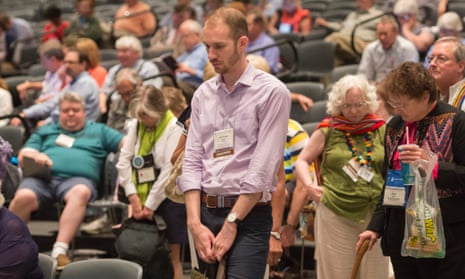Last week, the Presbyterian Church USA (PCUSA) voted to allow its clergy to officiate over same-sex marriages in states where it is legal, as part of its 221st General Assembly Meeting in Detroit, Michigan.
While this is a landmark decision for the denomination, it is one that perhaps will see more members leaving not just the denomination, but its seminaries. And, it may mean to the church’s dwindling membership that the denomination is shifting from moderate Presbyterianism to a more liberal Presbyterianism – which is indicative of the larger trends in the United States, but not of Presbyterianism in other parts of the world.
American Presbyterians as a whole have already lost a large percentage of their population since 2008, in part because of the creation of the Evangelical Covenant Order of Presbyterians (ECO) – which formed in 2012 as a response to the ordination of out gay men and lesbians within the PCUSA.
But though the denomination has seen a decline in membership – like most mainline churches in the United states – the decisions about marriage at the Assembly signal a new era in the life of the denomination.
The ruling on performing same-sex marriages – which goes into effect immediately after the General Assembly closes – will allow clergy to preside over same-sex marriage ceremonies without fear of reprisal from their presbyteries. In addition, the denomination also changed the wording of a man and a woman in the legal definition of marriage in its church documents to read "two people".
Rev. Debra Avery, the pastor of the First Presbyterian Church in Oakland, told me that the ruling represents a huge step: "I am so happy and pretty relieved to know that as a pastor in the State of California, I am free to celebrate a same gender marriage without fear of reprisal in ecclesiastical court."
Some in the denomination welcome these changes, but others view them with skepticism and alarm. The Presbyterian lay committee of the PCUSA issued a statement repudiating the action of the General Assembly of the PCUSA to redefine marriage, calling on members to protest to their pastors and their session over the change in the definition of marriage as "one man, one woman".
Issues over same-sex marriage and LGBT people in the PCUSA are not new: there is a 40-plus year history of arguments and tacit agreements over the issue of sexuality in the denomination, and the first openly gay minister in the PCUSA was ordained in 2011.
But this latest decision has special ramifications for the seminaries associated in various ways with the PCUSA, as well as its relationship with other denominations like the United Methodists and others who are adamantly opposed at this juncture to their clergy holding marriage services for same-sex couples.
The PCUSA currently has 10 seminaries in the United States train prospective clergy from the US and other countries, such as Korea and Ghana, for the ministry. These seminaries not only train those who wish ordination in the Presbyterian church, but other students from traditionally conservative denominations like the Assemblies of God (and other Pentecostal and non-denominational groups). The decision to allow clergy to perform same-sex marriages at the discretion of the congregation poses challenges for seminaries training new pastors who come from denominations fundamentally opposed on biblical grounds to same-sex marriage. While these students may not take Presbyterian ministry preparation courses, the push for denominational "purity" may result in an exodus from the denominational schools.
For outsiders, this may be a very big "so what"? For the seminaries in question (and seminaries that have large populations of Presbyterian seminarians, like the Fuller Theological Seminary in Pasadena, California) this shift represents a challenge to an already-suffering educational system. Seminaries in the US have been under intense financial strains since the economic collapse of 2008, and smaller seminaries have been laying off staff and even closing their doors altogether.
And while the decision made this past week at the General Assembly is a important one for the denomination, it portends further struggles around the issue of same-sex marriage and LGBT people in the Presbyterian community. The PSUSA may be a leaner, more progressive denomination at the end of this General Assembly – if the more conservative members of the denomination continue to leave with each change regarding marriage and sexuality.
Coupled with the decision to divest from three companies supplying Israel with electronic and earth moving equipment that has been used against Palestinians, the church is changing rapidly, and many of its potential ministers and members may continue the exodus. This dilemma is one many other denominations face, and many are not prepared for the tumult to come.
